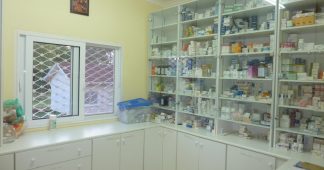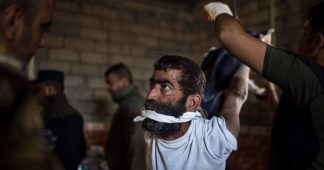by Tharishi Hewavithanagamage and Sajitha Prematunge
March 21, 2019
Sodium Hypochlorite aka bleach is a green-yellow liquid chemical that smells like chlorine. Serious damage can occur from an accidental splashing of bleach in the eyes. Depending on the degree of exposure, injury can range from temporary redness and irritation to blindness. In case of contact with eyes, it is advised to rinse eyes for at least 20 minutes, until medical help arrives. The kind of medical help that never arrived for Tamara Kunanayakam, former Permanent Representative of Sri Lanka to the United Nations in Geneva and Sri Lankan Ambassador to Holy See who was unfortunate enough to shop at the Thalawathugoda outlet of an international convenience store chain, SPAR.
Harrowing ordeal
Tamara Kunanayakam dropped by the SPAR outlet at Thalawathugoda on her way home on February 17 around 7.20 pm, to buy bleach among other things. “The bleach was on the top shelf and as I tried to take one, it tipped slightly and the bleach splashed over me and into my left eye,” Kunanayakam recounted the harrowing ordeal. Knowing the corrosive effect of bleach, Kunanayakam panicked and asked for the washroom. An employee showed her to the washroom. “I began rinsing my eyes immediately,” said Kunanayakam. Feeling a terrible burning sensation in her eye and alarmed when it seemed a black veil had fallen over it, she appealed to the employee for first aid, to call an emergency doctor, and to call the manager. With no help forthcoming and when it seemed some 20 minutes had passed rinsing, she left the washroom and approached the manager whose only reaction was to tell her to go to the Colombo National Eye hospital.
“I did not have a vehicle and they didn’t even offer to get me to the hospital.” She had to call a taxi herself and went first to the nearer Golden Key Hospital, which was en route to the National Eye Hospital. The Medical Officer on duty washed her eye with saline and told her there had been damage to the cornea. He warned “bleach is a corrosive substance and the damage could aggravate in the long run,” and advised that she proceed immediately to the National Eye Hospital. There, her eye was washed again and medication prescribed. She was told if there was no improvement within two weeks, she would have to go under the knife. “I was mortified I would lose my sight.”
On February 18, she made a complaint to the Thalangama Police. The police said there was clearly a lapse on the part of SPAR, it had acted irresponsibly violating rules and regulations relating to display of toxic and hazardous material in shops and public safety, and was liable for damages.
To make matters worse, Kunanayakam says she is being influenced to drop the complaint. “Acquaintances with obvious connections to SPAR have been asking me to talk to the management.”
Five days after the incident, a police sergeant attached to the Thalangama police station asked her to come to the Thalawathugoda SPAR outlet and show him where the incident took place. “But by that time they had removed the bleach containers from the top shelf.” The manager insisted that the bleach containers in question had not been placed on the top shelf. It took the CCTV footage from the store itself to prove him wrong.
“Had they been stored below eye level for easy access instead of on the top shelf, this wouldn’t have happened.” She pointed out that the packaging was faulty. “The bleach is a SPAR branded product and was still sealed when I tried to take it and it splashed over me.” She hoped public authorities will take this matter seriously. “The supermarket is a public place, it is also a question of public safety and public health, it could have happened to anyone,” she said.
Despite treatment, Kunanayakam continues to experience pain in that eye and sensitivity to light and has had a relapse. “I can no longer assume my professional commitments or even lead a normal life. I’m forced to wear dark glasses even indoors; I can’t use a computer or even read messages on my phone.”
Upon speaking to the Thalangama police station where the case was lodged, IP Thushara of the Minor Complaints Division said that samples of the bleach container will be sent to the Government Analyst’s Department for testing. The results will be produced in court and necessary actions will follow suit. When contacted by The Island, the Thalawathugoda SPAR outlet denied any knowledge of such an incident.
Ceylon Biscuits Limited, Commercial Director, Kithsiri Wickramage refused to comment as the issue is still under police investigation. He mentioned that he was at SPAR when the incident occurred. He speculated that the problem may have been caused due to customers taking the goods off shelves and replacing them after breaking their seals, and that it was difficult for them to pin-point the root cause.
SPAR opened its first supermarket in Thalawathugoda, on April 6, 2018, announcing plans to open 50 Spar supermarkets by 2023. SPAR Sri Lanka Ltd is a joint venture between SPAR South Africa and Ceylon Biscuits Limited.
SPAR’s infamous track record
SPAR is a Dutch multinational with headquarters in Amsterdam, Holland. In 1988, SPAR South Africa became a wholly-owned Tiger Brands subsidiary, but was unbundled and as a separate company in 2004. Tiger Brands is the South African packaged food company at the centre of what the UN has called the ‘worst outbreak of listeriosis recorded globally’ that began in January 2017. An on-going widespread outbreak of Listeria monocytogenes food poisoning that resulted from contaminated processed meats, it has resulted in more than 1,000 listeria poisoning cases in South Africa, and 216 deaths, among them almost 100 infants under 28 days old.
SPAR has been implicated in tampering with labels and food poisoning in South Africa. Meanwhile in Zambia, Health Inspectors seized cosmetic and food products. According to the local City Council some products were leaking and had no expiry dates while others had broken seals and insufficient labelling. Further, some products were defectively packaged and expired, which contravene the Food and Drugs Act of the country. SPAR has also been accused of importing goods without permits and selling Genetically Modified (GMO) food without permits. In UK, SPAR food has been recalled due to presence of mould and in another case as it may have contained small pieces of glass.
According to European Commissioner for Justice and Consumers, V?ra Jourová, multinational food and drink companies, including Spar, have been flagrantly breaking the law. They have “cheated and misled” shoppers in Eastern Europe for years, by selling them inferior versions of well-known brands. They sell vastly different products to different countries, using identical branding on their packaging, making huge profits in the process.
According to Sputnik News article titled ‘Dual Food: Same Western Branding But Low-Quality Goods for Eastern Europe’, such companies have claimed that differences in the contents of identically-branded products occur when products are adapted to fit what they claim are local tastes.
Fielding accusations of double standards, a Spar representative had asserted to The Guardian, “Our policy is to fulfil consumer wishes, so each Spar country has its own Spar products; the recipes are developed in the country.” Which begs the question, are leaking bleach containers the standard to which Sri Lanka has stooped?
SPAR has come under fire by Norwegian environmental groups for exploitation of protected species and cruelty to animals by selling products supported by the whaling industry. According to Penza News, SPAR has been accused of violation of food storage conditions in Penza, Russia.
Subsequent inquiries by Kunanayakam revealed that the faulty bleach containers are still available for sale at the Thalawathugoda outlet. “Which is proof enough they don’t care. They only want to sell their products, however substandard, to make profit out of products they cannot sell in the West where there are strict rules and where those rules are rigorously enforced. It is a case of illegal dumping of substandard products in Third World countries or, as it is now increasingly the case, also in Eastern Europe,” said Kunanayakam.
Published at http://www.island.lk/index.php?page_cat=article-details&page=article-details&code_title=201399











